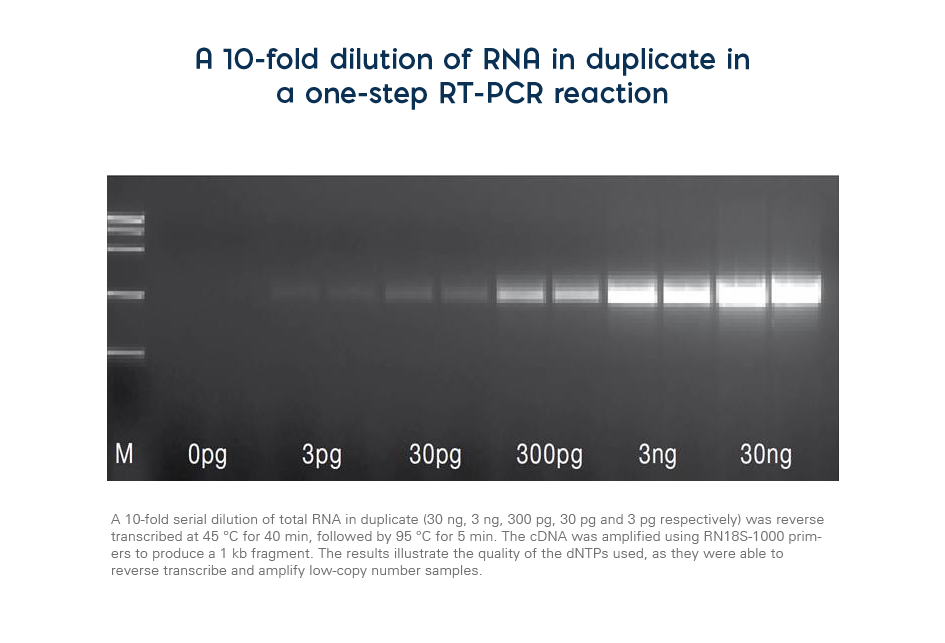dNTP Mix, 100mM, Sodium Salt
A mix of ready-to-use general grade dNTPs containing dATP, dGTP, dCTP, and dTTP (100mM total), supplied as sodium salts in purified water at pH 7.5, enzymatically synthesized from quality raw materials, using highly specific production systems. The manufacturing process eliminates impurities and PCR-specific inhibitors such as modified nucleotides, tetraphosphates, and pyrophosphates commonly observed in other commercially available dNTP products (>99% purity determined by quantitative HPLC).

dNTP Mix, 100mM (Sodium), MDX084
钠盐溶液中 dATP、dGTP、dCTP 和 dTTP 各 25 mM 的超纯混合物,由优质原料酶法合成。
文档与资源
The manufacturing process eliminates impurities and PCR-specific inhibitors such as modified nucleotides, tetraphosphates, and pyrophosphates commonly observed in other commercially available dNTP products (>99% purity determined by quantitative HPLC).
产品资料
核苷酸核苷酸
FAQs: dNTP Mix, 100mM
dNTPs or deoxynucleotide triphosphates are the “building blocks” for DNA. Purity and stability of dNTPs are two of the essential factors to achieve a successful PCR. The use of a highly purified dNTP preparation is particularly recommended for sensitive techniques such as long-range PCR, RT-PCR, multiplex PCR, mutagenesis experiments and real-time applications. The purity of dNTPs is also important when the starting amount of template is minimal.
The standard concentration of a dNTP for PCR reactions is 0.2 mM. If the starting stock is a 25 mM solution of each dNTP in a 100mM dNTP Mix, you need to add 0.5 µL to a 50 µL standard PCR reaction.
It depends. You probably can increase the DNA yield, but you will have to optimize the complete PCR reaction, adjust the buffer, the Mg2+ and so on. It is not a matter pertaining only to nucleotides.
Yes. The sodium salt dNTP products are a standard grade and so we recommend these dNTPs for PCR. For more sophisticated reactions such as amplification of long templates, real-time PCR and NGS, we recommend lithium salt dNTP products.
Yes. The optimal pH for storage of nucleotides is from pH 7.5-8.2 (pH at 20°C). An acidic pH will cause hydrolysis of dNTPs (deoxynucleotide triphosphates) to dNDPs (deoxynucleotide diphosphates) and dNMPs (deoxynucleotide monophosphates), rendering them less suitable for PCR applications. During freezing/thawing cycles, the pH of the dNTP solutions can differ from the pH at 20°C. Sodium salts are temperature sensitive, so care needs to be taken when repeatedly frozen and thawed and sodium salt dNTPs are better aliquoted into smaller volumes and kept frozen in order to extend their shelf life.
dNTPs的酶法合成使用高度特异性的酶法系统,消除杂质和PCR抑制剂,如修饰的核苷酸、PPi和脱氧核苷四磷酸。 化学生产过程中产生的污染物,如痕量的dNDPs、焦磷酸盐或其他离子物种(如醋酸盐),阻碍了PCR反应。 这种污染可能导致低产量或根本没有扩增产物。 除非彻底纯化,否则化学合成的dNTPs通常含有四磷酸脱氧核苷,这是强有力的PCR抑制剂。 化学合成也可以导致脱氨和其他核苷酸修饰,而酶法合成dNTPs可以绕过这些风险。
The concentration of our dNTP Mix are total – 100 mM dNTP Mix is made up of 25 mM of each dNTP (dATP, dCTP, dGTP and dTTP).
We recommend that you dilute your dNTPs using molecular biology or PCR grade water.
Yes, all of our dNTPs are glycerol-free and so can be lyophilized.
与我们的专业团队联系
想了解更多迈迪安免疫和分子产品信息?欢迎与我们联系